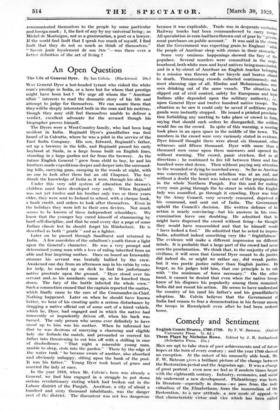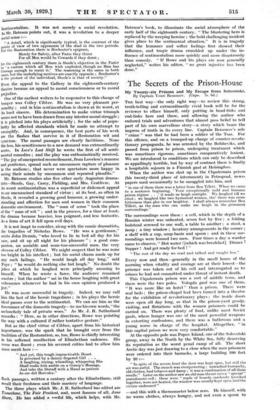Comedy and Sentiment English Comic Drama, 1700-1750. By F. W.
Bateson. (Oxford University Press. 7s. 6d.) Three Plays by Nicholas Rowe. Edited by R. Sutherland. (Scholartis Press. 21s.) MEN are apt to take stock of past achievements and of future hopes at the turn of every century ; and the year 1700 showed no exception. At the outset of his unusually able book, Mr. F. W. Rateson gives a brilliant picture of the change between the Restoration period and the Augustan age.. It was a change of great portent : even now we feel as if modern times began with the eighteenth century. Industry, economics, and social life underwent a new development. Philanthropy was born. In literature—especially in drama—we pass from the indi- vidualism of the Elizabethans; from the imrnoralism of the Restoration, to a new attitude, a new mode of appeal—to that characteristic virtue and vice which has been called Sentimentalism. It was not merely a social revolution. As Mr. Bateson points out, it was a revolution to a deeper
social sense :-
" A detail, which is significantly typical, is the contrast of the points of view of two opponents of the duel in the two periods. Per the Restoration there is Rochester's epigram,
Merely for Safety, after Fame they thirst For all Men would be Cowards if they durst ;
for the eighteenth century there is Steele's objection in the Taller to ' a custom which all Men wish exploded, though no Man has courage enough to resist it.' The reasoning is the same in both uses, but the underlying motives are exactly opposite ; Rochester's is the protest of the Individual, Steele's is that of society."
Even the appeal to the Gallery in the eighteenth-century theatre became an appeal to moral consciousness or to moral prejudice.
One of the earliest writers to be responsive to this change of temper was Colley Cibber. He was no very pleasant per- sonality ; and in him sentimentalism is shown at its worst, at its least sincere. His determination to make virtue triumph seems not to have been drawn from any interior moral struggle ; it is pitched into his plays artificially ; for the sake of popu-
larity he affected standards which he made no attempt to exemplify. And, in consequence, the best parts of his werk see the flashes that survive in it of Restoration wit and cynicism. The moral passages are clearly factitious. None the less, his sensitiveness to a new demand was extraordinarily acute. In Love's Last Shift he wrote the first of all senti-
mental comedies ; and the play was enthusiastically received. "The joy of unexpected reconcilement, from Loveless's remorse and penitence, spread such an uncommon rapture of pleasure in the audience, that never were spectators more happy in easing their minds by uncommon and repeated plaudits." Mr. Bateson studies also five other early Augustan drama- tists—Steele, Gay, Carey, Fielding, and Mrs. Centlivre. At
its worst sentimentalism was a superficial or dishonest appeal-
to an unexamined standard of virtue ; at its best, as often in Steele, it revealed a growing good humour, a growing under- standing and affection for men and women in their common domestic environment. The " man of sense " took the place of the " man of wit " ; and in the process, for a time at least, the drama became heavier, less poignant, and less fantastic.
As a form of art it fell upon evil days.
It is not inapt to consider, along with the comic dramatists, the tragedies of Nicholas Rowe. "He was a gentleman," wrote John Dennis, "who loved to lie in bed all day for his ease, and sit up all night for his pleasure " ; a good com-
panion, an amiable and none-too-successful man, the very obverse of Colley Cibber. We might suspect that he was none too bright in his intellect ; but his social charm made up for any such failings. " He would laugh all day long," said Pope ; " he would do nothing else but laugh." No doubt the jokes at which he laughed were principally amusing to himself. When he wrote a farce, the audience remained sombre ; but the author " sat in the house laughing with great
vehemence whenever he had in his own opinion produced a jest.,,
He was more successful in tragedy. Indeed, we may call him the last of the heroic tragedians ; in his plays the heroic ideal passes over to the sentimental. We can see him as the forerunner of the domestic tragedy—to use his own words," the melancholy tale of private woes." As Mr. J. R. Sutherland remarks : " Here, as in other directions, Rowe was pointing the way with a cultured if rather tentative gesture."
But as the chief virtue of Cibber, apart from his historical importance, was the spark that he brought over from the tradition of the Restoration, so, too, Rowe is chiefly interesting in his softened recollection of Elizabethan cadences. His verse was fluent ; even his severest critics had to allow him some merit here :-
" And yet, this tough impracticable Heart Is governed by a dainty-fingered Girl . . . A laughing, toying, wheedling, whispering She Shall make him amble on a Gossip's Message, And take the Distaff with a Hand as patient As ere did Hercules."
Such passages, written a century after the Elizabethans, still recall their freshness and their mastery of language.
The three plays which Mr. J. R. Sutherland has edited are Tamerlane, The Fair Penitent, and, most famous of all, Jane Shore. He has added a ageful life, which helps, with Mr. Bateson's book, to illuminate the social atmosphere of thel early half of the eighteenth century. " The blustering hero is replaced by the weeping heroine ; the bold challenging incident gives place to the sentimental situation." It is in tragedy that the humaner and softer feelings first showed their influence, and tragic drama crumbled up under the in- fluence of sentimentalism more quickly and more disastrously than comedy. " If Rowe and his plays are now generally neglected," writes his editor, " no great injustice has been done."



















































 Previous page
Previous page